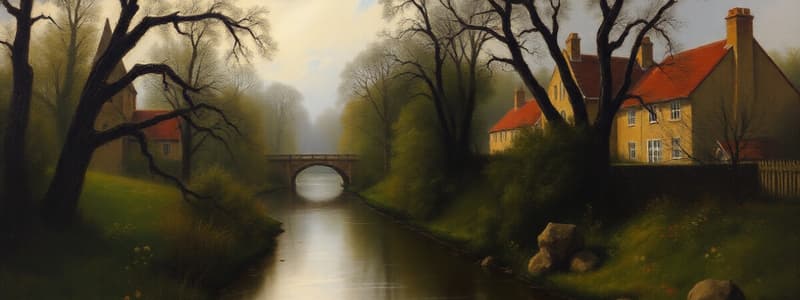Podcast
Questions and Answers
Where is the Nico Ditch located?
Where is the Nico Ditch located?
- Greater Manchester, England (correct)
- Scotland
- Wales
- Yorkshire, England
What is the approximate length of the Nico Ditch?
What is the approximate length of the Nico Ditch?
- 3 miles (4.8 km)
- 6 miles (9.7 km) (correct)
- 12 miles (19.3 km)
- 1 mile (1.6 km)
Between which centuries was the Nico Ditch likely constructed?
Between which centuries was the Nico Ditch likely constructed?
- 1st and 3rd
- 15th and 17th
- 18th and 20th
- 5th and 11th (correct)
What was the possible purpose of the Nico Ditch?
What was the possible purpose of the Nico Ditch?
In what document is the earliest reference to the Nico Ditch found?
In what document is the earliest reference to the Nico Ditch found?
What is the Latin term used to describe Nico Ditch in early documents?
What is the Latin term used to describe Nico Ditch in early documents?
From what Anglo-Saxon word might the name 'Nico' be derived?
From what Anglo-Saxon word might the name 'Nico' be derived?
What does the Anglo-Saxon word 'micel' mean?
What does the Anglo-Saxon word 'micel' mean?
Through which of these places does Nico Ditch pass?
Through which of these places does Nico Ditch pass?
What is located near where the Nico Ditch may have ended?
What is located near where the Nico Ditch may have ended?
The Nico Ditch may have marked a boundary between which two kingdoms?
The Nico Ditch may have marked a boundary between which two kingdoms?
What was a requirement, according to legend, for each man constructing the Nico Ditch?
What was a requirement, according to legend, for each man constructing the Nico Ditch?
What was a 19th-century folk etymology for the name 'Reddish'?
What was a 19th-century folk etymology for the name 'Reddish'?
What did archaeological investigations reveal about the bank north of the Nico Ditch?
What did archaeological investigations reveal about the bank north of the Nico Ditch?
What shape is the Nico Ditch's profile?
What shape is the Nico Ditch's profile?
Which of the following is considered one of the best-preserved remains of the Nico Ditch?
Which of the following is considered one of the best-preserved remains of the Nico Ditch?
In which park is a segment of the Nico Ditch protected as a Scheduled Ancient Monument?
In which park is a segment of the Nico Ditch protected as a Scheduled Ancient Monument?
When was a segment of the Nico Ditch in Platt Fields protected as a Scheduled Ancient Monument?
When was a segment of the Nico Ditch in Platt Fields protected as a Scheduled Ancient Monument?
How wide is the Nico Ditch at some of the most well-preserved sections?
How wide is the Nico Ditch at some of the most well-preserved sections?
What is the possible meaning of Nico coming from nǽcan?
What is the possible meaning of Nico coming from nǽcan?
Flashcards
What is Nico Ditch?
What is Nico Ditch?
A six-mile (9.7 km) long linear earthwork in Greater Manchester, England, possibly a defensive fortification or boundary marker.
When was Nico Ditch constructed?
When was Nico Ditch constructed?
Between the 5th and 11th century.
What was the original purpose of Nico Ditch?
What was the original purpose of Nico Ditch?
Defensive fortification or an administrative boundary.
Which boroughs' boundaries coincide with Nico Ditch?
Which boroughs' boundaries coincide with Nico Ditch?
Signup and view all the flashcards
Origin of the name 'Nico Ditch'?
Origin of the name 'Nico Ditch'?
Signup and view all the flashcards
Which kingdoms struggled for control of North West England?
Which kingdoms struggled for control of North West England?
Signup and view all the flashcards
Who is Hnickar?
Who is Hnickar?
Signup and view all the flashcards
Where is the best-preserved section of Nico Ditch?
Where is the best-preserved section of Nico Ditch?
Signup and view all the flashcards
What happened in Manchester in 870, according to legend?
What happened in Manchester in 870, according to legend?
Signup and view all the flashcards
Who designed the Nico Ditch?
Who designed the Nico Ditch?
Signup and view all the flashcards
Study Notes
- Nico Ditch is a 6 mi (9.7 km) long earthwork in Greater Manchester, England.
- It stretches between Ashton-under-Lyne and Stretford.
- The ditch was constructed between the 5th and 11th centuries.
- It may have been a defensive fortification or a boundary marker.
- Short sections remain visible, for example, a 330-yard (300 m) stretch is in Denton Golf Course.
- Surviving parts measure 4–5 yards (3.7–4.6 m) wide and up to 5 feet (1.5 m) deep.
- A portion of the earthwork is a protected Scheduled Ancient Monument.
Etymology
- The earliest reference is in a charter from 1190 to 1212, granting land in Audenshaw to Kersal Cell monks.
- In this document, it is referred to as "Mykelldiche" and magnum fossatum (Latin for "large ditch").
- The name Nico became established in the 19th and 20th centuries.
- Nico may come from the Anglo-Saxon Hnickar, a water spirit.
- More likely, Nico is a corruption of "Mykelldiche," where the Anglo-Saxon micel means "big" or "great."
- An alternative derivation of Nico is from nǽcan, an Anglo-Saxon verb meaning "kill".
Course
- The ditch runs from Ashton Moss (SJ909980) in Ashton-under-Lyne to Hough Moss (SJ82819491) east of Stretford.
- It passes through Denton, Reddish, Gorton, Levenshulme, Burnage, Rusholme, Platt Fields Park, Withington, and Chorlton-cum-Hardy.
- The ditch crosses four metropolitan boroughs in Greater Manchester.
- It aligns with the boundaries between Stockport and Manchester, and Tameside and Manchester.
- It extends as far as Denton golf course.
- Part of the ditch is under the Audenshaw Reservoirs, built in the late 19th century.
- It may have extended west beyond Stretford to Urmston (SJ78299504).
History
- Constructed between the end of Roman rule in the early 5th century and the Norman conquest in 1066.
- The original purpose is unknown, but it may have been a defensive fortification or administrative boundary.
- It may have marked a 7th-century boundary for Anglo-Saxon expansion.
- Alternatively, it could have been a late 8th or early 9th century boundary between Mercia and Northumbria.
- During the early medieval period, Northumbria, Mercia, and Wessex fought for control of North West England, alongside the Britons and Danes.
- The ditch has been used as a boundary since at least the Middle Ages.
- Legend says the inhabitants of Manchester completed it in a single night as protection against Viking invaders in 869–870.
- Supposedly, each man had to dig his section and build a bank equal to his own height.
- 19th-century folklore claimed a battle between Saxons and Danes occurred at the ditch.
- This battle supposedly gave Gorton and Reddish their names ("Gore Town" and "Red-Ditch"), but historians dismiss this.
- "Gorton" derives from "dirty farmstead," and "Reddish" from "reedy ditch."
- Antiquarians and historians have studied the ditch since the 19th century.
- Much of its course has been built over.
- Between 1990 and 1997, the University of Manchester Archaeological Unit excavated sections in Denton, Reddish, Levenshulme, and Platt Fields.
- These excavations aimed to determine its age and purpose.
- No construction date was established.
- Investigations revealed the bank north of the ditch is of 20th-century origin.
- The ditch's U-shape profile (rather than the V-shape typical of military defenses) suggests a territorial boundary marker.
- The project concluded the ditch was probably a boundary marker.
Preservation
- Despite weathering, short sections are still visible, measuring 4–5 yards (3.7–4.6 m) wide and up to 5 feet (1.5 m) deep.
- The 330-yard (300 m) stretch through Denton Golf Course and the section in Platt Fields Park are best preserved.
- In 1997, a 150-yard (140 m) segment in Platt Fields was protected as a Scheduled Ancient Monument.
- The remainder of the ditch is unprotected.
Studying That Suits You
Use AI to generate personalized quizzes and flashcards to suit your learning preferences.




